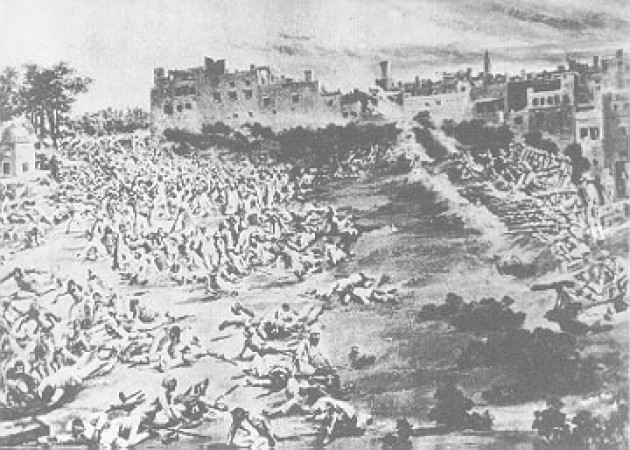
The Jallianwala Bagh Massacre stands as one of the darkest and most poignant chapters in Indian history. The tragic event, which unfolded on April 13, 1919, in Amritsar, Punjab, India, forever etched its impact on the nation's collective consciousness. This article delves into the harrowing incident and its profound repercussions on Indian society, politics, and the struggle for independence.
The Background and Context of the Jallianwala Bagh Massacre
Before delving into the events of April 13, 1919, it is crucial to understand the broader context in which the massacre occurred. During the early 20th century, India was under the oppressive rule of the British Raj. The Indian independence movement was gaining momentum, challenging the imperialist regime's dominance. Tensions were running high, and acts of civil disobedience were becoming more frequent.
The Incident Unfolds: Tragedy at Jallianwala Bagh
On the fateful day of April 13, 1919, a large gathering of peaceful protestors had assembled at Jallianwala Bagh, a public garden in Amritsar, to protest the repressive Rowlatt Act. Acting Brigadier General Reginald Dyer, with a contingent of British soldiers, arrived at the scene and ordered his troops to open fire on the unarmed crowd, without any warning. The ruthless massacre resulted in hundreds of innocent lives being lost and thousands injured.
Aftermath and Impact on Indian Society
The Jallianwala Bagh Massacre left an indelible scar on the Indian psyche. The brutality of the British forces shattered the trust of the Indian people in their colonial rulers. It fueled an intense wave of anger, grief, and resentment across the nation. The incident led to widespread protests, strikes, and public outrage, laying the groundwork for a more robust independence movement.
Political Reactions and British Rule
The Jallianwala Bagh Massacre sent shockwaves through the Indian political landscape. Moderate leaders turned more radical, demanding complete independence from British rule. The incident also exposed the oppressive nature of the British administration, leading to international condemnation and mounting pressure on the colonial government.
Remembering the Martyrs: Commemorations and Memorials
The martyrs of Jallianwala Bagh were immortalized in the hearts of the Indian people. Various memorials, statues, and commemoration events were erected across the country to honor their sacrifice and keep the memory alive.
The Long-Term Consequences on India's Independence Movement
The Jallianwala Bagh Massacre acted as a catalyst for India's independence movement. The brutal incident galvanized the Indian populace and unified the nation's resolve to break free from British oppression.
The Jallianwala Bagh Massacre in Indian Literature and Art
The tragic event has been a recurring theme in Indian literature, art, and cinema. Writers, poets, and filmmakers have depicted the horrors of Jallianwala Bagh, immortalizing it as a symbol of resistance and resilience.
The Event's Historical Documentation and Interpretations
Historians have extensively documented the Jallianwala Bagh Massacre, analyzing its causes, implications, and historical significance. Different interpretations continue to shape our understanding of the event.
Revisiting the Massacre: Modern Perspectives and Reflections
Even a century later, the Jallianwala Bagh Massacre remains a topic of reflection and debate. Modern scholars and intellectuals offer new insights and perspectives on this tragic event, emphasizing its relevance to contemporary struggles for justice and human rights.
Lessons Learned: Human Rights and the Pursuit of Justice
The Jallianwala Bagh Massacre serves as a stark reminder of the importance of safeguarding human rights and the need for accountability for those in positions of power.
The Massacre's Influence on Nonviolent Resistance and Civil Disobedience
The incident had a profound impact on India's approach to resistance. Mahatma Gandhi and other leaders embraced nonviolent resistance as a potent tool against oppression, leading to transformative movements like Satyagraha.
International Responses and Colonial Critique
The Jallianwala Bagh Massacre sparked international outrage and criticism of British colonial policies. The incident hastened the decline of the British Empire's reputation on the global stage.
Healing Wounds: Steps towards Reconciliation
Efforts towards reconciliation between India and the United Kingdom have been ongoing. The incident's memory remains a powerful reminder of the importance of fostering understanding and reconciliation.
The Jallianwala Bagh Massacre remains an indelible scar on the pages of Indian history. It stands as a somber testament to the power of unity, resilience, and the unyielding spirit of a nation striving for justice and freedom. The tragic event continues to shape India's journey, serving as a reminder of the need to safeguard human rights and uphold the values of peace and nonviolence.
Subway India outlets drop tomatoes from menu citing THESE reasons